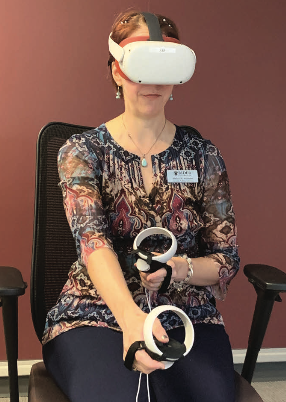
Rider librarians find new way to improve the student learning experience
By Olivia Nicoletti and Tori Pender
At the start of April, Rider’s librarians introduced a new virtual reality (VR) experience to the community after receiving a grant from the American Library Association.
The first event that launched successfully was the Anne Frank experience which runs from April 4 to April 22. According to Sharon Whitfield, an associate professor and librarian, four more virtual experiences are planned to be released by the fall.
The idea was to allow students to use hands-on equipment and immerse themselves in the environment to better understand the story at hand.
Associate professor and librarian Melissa Hofmann said, “We anticipate that participants will develop skills in perspective-taking and/or empathy for others, particularly those in marginalized groups, that will lead to changes in behavior. They will explore what it means to be human outside of their own experiences and revise their preconceived notions, or attitudes and views based on stereotypes, getting a new appreciation for the reality in humanity of others. And based on the effective agent of experience of the VR, we will offer debriefing discussions, film screenings and books to provide integration of an effect with history and context.”
The grant allowed for the purchase of five Oculus VR headsets. The purchase of books to go alongside the experience was another advantage to help students fully understand the story being displayed.
Due to the pandemic, the library is equipped with a sterilizer in which the staff can place the headset between each use to lessen the spread of germs.
The headset has a silicone lining that comes into direct contact with the skin of whoever is using it. For students with a silicone allergy, Hofmann said that a disposable face shield is available for use.
When a student is actively using the VR system, a staff member will assist them at all times to make sure it is executed safely.
Currently, due to the lack of space and staff, only two or three students can use the system at a time.
The dean’s old office and the conference room are two spaces within the library being used to host students, but the librarians hope that in the future more space can be dedicated to these programs.
Hofmann said there were plans of introducing virtual reality in classrooms to further utilize equipment and bring hands-on experiences to students.
Stepping into VR
Once putting the VR headset on and going into story mode, the participant is transported into a black room that gives a brief historical overview of the events leading up to Frank and her family hiding within the upper floors of Opekta, her father, Otto Frank’s business in the Netherlands.
From a first-person perspective, going into the attic and maneuvering through the rooms showed how loud their surroundings were. With constant airplanes, presumingly warplanes flying overhead, it emphasized how quiet the eight occupants had to be.
Within the tour, every small detail was included. Participants had to pick up Frank’s original diary when in her and her sister’s room. Inside the main living room space, a board game that looked similar to monopoly called, “Het Beursspel” was displayed on the table. Each depiction was historically accurate and showed the significance of items within each room.
The last room on the tour was the uppermost room of the attic, the storage room. The room contained many stored food from food preserve jars to a giant pile of brown sacks.
According to Hofmann, a desired outcome of the VR experience would be participants recognizing how “systematic policies affect individual circumstances and biases, to understand how historical and cultural events continue to impact society, to improve their cultural literacy and work toward a more just and civil society where people are free to express their full humanity.”


